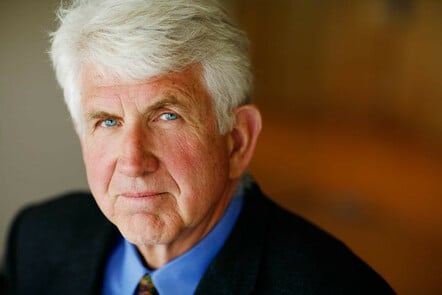This article is more than 1 year old
Turing Award goes to Robert Metcalfe, co-inventor of the Ethernet
A cool $1 million to a man who is not afraid to eat his own words, nor roll out his own cable
Professor, engineer and namesake of Metcalfe's law Robert Metcalfe is the latest winner of the Turing Award for an invention he made back in the 1970s: the Ethernet.
Xerox's Palo Alto Research Center (PARC) was just a few years old when Metcalfe arrived and set up the lab with that internet precursor, ARPANET.
But that didn't connect the hundred new Alto personal computers and laser printers, so Metcalfe drew on his experiences with the University of Hawaii's AlohaNet, and together with the late David Boggs built a hundred node network - now known as the first Ethernet - in two years.
The network, originally a single wire bus with a single transceiver per node, was eventually replicated across Xerox until it became a corporate internet, and then an internet for the world.
"When David and I were building this thing at PARC, we planned to run a cable up and down every corridor to actually create an omnipresent, completely passive medium for the propagation of electromagnetic waves. In this case, data packets," Metcalfe previously told The Register.
That first Ethernet ran at 2.94 megabits per second, a rate 10,000 times faster than the terminal networks before it. The design was documented in a 1976 article titled "Ethernet: Distributed Packet Switching for Local Computer Networks."
Leading a team, Metcalfe then developed the 10Mbps Ethernet which standards are now based on.
"It is rare to see a technology scale from its origins to today's multigigabit-per-second capacity," said ACM president Yannis Ioannidis. "Even with the advent of Wi-Fi, Ethernet remains the staple mode of data communication, especially when security and reliability are prioritized."
- And the Turing Award for best compilation goes to... Jeffrey Ullman and Alfred Aho
- ARPANET pioneer Jack Haverty says the internet was never finished
- 'Mother of Internet' Radia Perlman argues for centralized infrastructure
- Jeffrey Snover claims Microsoft demoted him for inventing PowerShell
Metcalfe's invention soon became as ubiquitous in some parts of the world as aircon or indoor plumbing, in fact it is referred to as "the internet's standard plumbing." By 2008, IDC pegged worldwide Ethernet switch ports at 350 million. That number doesn't include Wi-Fi gear. The analyst firm reported worldwide Ethernet values for the full year 2022 at $36.5 billion.
"Today, with an estimated 7 billion ports around the globe, Ethernet is so ubiquitous that we take it for granted," commented Google exec Jeff Dean.
Metcalfe went on to do many things, like founding 3Com Corporation where he introduced the technology to the likes of Intel and Digital Equipment Corporation (DEC). He also worked as a venture capitalist and for a decade wrote a column called "From The Ether" for InfoWorld Magazine. And for roughly 11 years, he was a professor at The University of Texas at Austin.
"David Boggs and I built the first Ethernet and in this picture David holds our 0th Ethernet interface card. I am holding the 500,000th Ethernet NIC designed, manufactured, marketed, sold, and supported by 3Com," Metcalfe commented Thursday on a picture the Association for Computing Machinery posted on LinkedIn.
"The internet turned 50 in 2019. The most important new fact about the human condition is that we are now suddenly connected," said the Turing Award winner in his LinkedIn bio.
The law that bears his name states the value of a network is proportional to the square of the number of its connected users. This initially described compatible communicating devices but now reflects more globalized users and networks.
But Metcalfe isn't afraid to have a sense of humor about himself. One of his most bizarre public appearances was eating a printed copy of one of his columns, blended with added liquid, at a conference. The boffin had predicted the internet would suffer a "catastrophic collapse" in his column in 1996 and promised to eat his words if he was wrong. He was held to it.
The Turing Award comes with a cool $1 million. Financial support is provided by Google. ®

